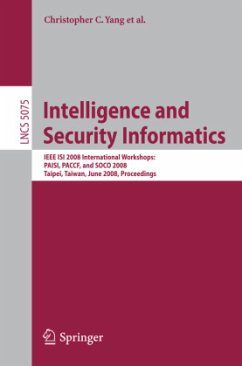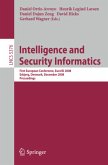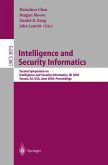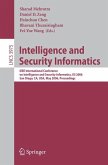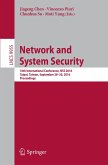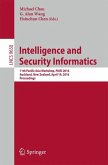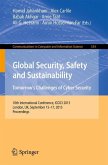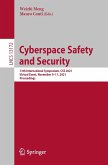Christopher C. Yang / Hsinchun Chen / Michael Chiu-Lung Chau / Kuiyu Chang / Sheau-Dong Lang / Patrick Chen / Raymond Hsieh / Daniel Zeng / Fei-Yue Wang / Kathleen M. Carley / Wenji Mao / Justin Zhan (eds.)IEEE ISI 2008 International Workshops: PAISI, PACCF and SOCO 2008, Taipei, Taiwan, June 17, 2008, Proceedings
Intelligence and Security Informatics
IEEE ISI 2008 International Workshops: PAISI, PACCF and SOCO 2008, Taipei, Taiwan, June 17, 2008, Proceedings
Herausgegeben:Yang, Christopher C.; Chen, Hsinchun; Chau, Michael; Chang, Kuiyu; Lang, Sheau-Dong
Christopher C. Yang / Hsinchun Chen / Michael Chiu-Lung Chau / Kuiyu Chang / Sheau-Dong Lang / Patrick Chen / Raymond Hsieh / Daniel Zeng / Fei-Yue Wang / Kathleen M. Carley / Wenji Mao / Justin Zhan (eds.)IEEE ISI 2008 International Workshops: PAISI, PACCF and SOCO 2008, Taipei, Taiwan, June 17, 2008, Proceedings
Intelligence and Security Informatics
IEEE ISI 2008 International Workshops: PAISI, PACCF and SOCO 2008, Taipei, Taiwan, June 17, 2008, Proceedings
Herausgegeben:Yang, Christopher C.; Chen, Hsinchun; Chau, Michael; Chang, Kuiyu; Lang, Sheau-Dong
- Broschiertes Buch
- Merkliste
- Auf die Merkliste
- Bewerten Bewerten
- Teilen
- Produkt teilen
- Produkterinnerung
- Produkterinnerung
This book constitutes the refereed proceedings of the three international workshops PAISI 2008, PACCF 2008, and SOCO 2008, held as satellite events of the IEEE International Conference on Intelligence and Security Informatics, ISI 2008, in Taipei, Taiwan, in June 2008.
The 55 revised full papers presented were carefully reviewed and selected from the presentations at the workshops. The 21 papers of the Pacific Asia Workshop on Intelligence and Security Informatics (PAISI 2008) cover topics such as information retrieval and event detection, internet security and cybercrime, currency and data…mehr
Andere Kunden interessierten sich auch für
![Intelligence and Security Informatics Intelligence and Security Informatics]() Daniel Ortiz-Arroyo / Henrik Legind Larsen / Daniel et al. Zeng (Volume editor)Intelligence and Security Informatics38,99 €
Daniel Ortiz-Arroyo / Henrik Legind Larsen / Daniel et al. Zeng (Volume editor)Intelligence and Security Informatics38,99 €![Intelligence and Security Informatics Intelligence and Security Informatics]() Hsinchun Chen / Reagan Moore / Daniel D. Zeng / John Leavitt (eds.)Intelligence and Security Informatics77,99 €
Hsinchun Chen / Reagan Moore / Daniel D. Zeng / John Leavitt (eds.)Intelligence and Security Informatics77,99 €![Intelligence and Security Informatics Intelligence and Security Informatics]() Sharad Mehrotra / Daniel D. Zeng / Hsinchun Chen (eds.)Intelligence and Security Informatics78,99 €
Sharad Mehrotra / Daniel D. Zeng / Hsinchun Chen (eds.)Intelligence and Security Informatics78,99 €![Network and System Security Network and System Security]() Network and System Security38,99 €
Network and System Security38,99 €![Intelligence and Security Informatics Intelligence and Security Informatics]() Intelligence and Security Informatics38,99 €
Intelligence and Security Informatics38,99 €![Global Security, Safety and Sustainability: Tomorrow's Challenges of Cyber Security Global Security, Safety and Sustainability: Tomorrow's Challenges of Cyber Security]() Global Security, Safety and Sustainability: Tomorrow's Challenges of Cyber Security38,99 €
Global Security, Safety and Sustainability: Tomorrow's Challenges of Cyber Security38,99 €![Cyberspace Safety and Security Cyberspace Safety and Security]() Cyberspace Safety and Security49,99 €
Cyberspace Safety and Security49,99 €-
-
-
This book constitutes the refereed proceedings of the three international workshops PAISI 2008, PACCF 2008, and SOCO 2008, held as satellite events of the IEEE International Conference on Intelligence and Security Informatics, ISI 2008, in Taipei, Taiwan, in June 2008.
The 55 revised full papers presented were carefully reviewed and selected from the presentations at the workshops. The 21 papers of the Pacific Asia Workshop on Intelligence and Security Informatics (PAISI 2008) cover topics such as information retrieval and event detection, internet security and cybercrime, currency and data protection, cryptography, image and video analysis, privacy issues, social networks, modeling and visualization, and network intrusion detection. The Pacific Asia Workshop on Cybercrime and Computer Forensics (PACCF 2008) furnishes 10 papers about forensic information management, forensic technologies, and forensic principles and tools. The 24 papers of the Workshop on Social Computing (SOCO 2008) are organized in topical sections on social web and social information management, social networks and agent-based modeling, as well as social opinions, e-commerce, security and privacy considerations.
The 55 revised full papers presented were carefully reviewed and selected from the presentations at the workshops. The 21 papers of the Pacific Asia Workshop on Intelligence and Security Informatics (PAISI 2008) cover topics such as information retrieval and event detection, internet security and cybercrime, currency and data protection, cryptography, image and video analysis, privacy issues, social networks, modeling and visualization, and network intrusion detection. The Pacific Asia Workshop on Cybercrime and Computer Forensics (PACCF 2008) furnishes 10 papers about forensic information management, forensic technologies, and forensic principles and tools. The 24 papers of the Workshop on Social Computing (SOCO 2008) are organized in topical sections on social web and social information management, social networks and agent-based modeling, as well as social opinions, e-commerce, security and privacy considerations.
Produktdetails
- Produktdetails
- Lecture Notes in Computer Science 5075
- Verlag: Springer / Springer Berlin Heidelberg / Springer, Berlin
- Artikelnr. des Verlages: 12278909, 978-3-540-69136-5
- 2008
- Seitenzahl: 548
- Erscheinungstermin: 29. Mai 2008
- Englisch
- Abmessung: 235mm x 155mm x 30mm
- Gewicht: 831g
- ISBN-13: 9783540691365
- ISBN-10: 3540691367
- Artikelnr.: 23898200
- Herstellerkennzeichnung
- Springer-Verlag GmbH
- Tiergartenstr. 17
- 69121 Heidelberg
- ProductSafety@springernature.com
- Lecture Notes in Computer Science 5075
- Verlag: Springer / Springer Berlin Heidelberg / Springer, Berlin
- Artikelnr. des Verlages: 12278909, 978-3-540-69136-5
- 2008
- Seitenzahl: 548
- Erscheinungstermin: 29. Mai 2008
- Englisch
- Abmessung: 235mm x 155mm x 30mm
- Gewicht: 831g
- ISBN-13: 9783540691365
- ISBN-10: 3540691367
- Artikelnr.: 23898200
- Herstellerkennzeichnung
- Springer-Verlag GmbH
- Tiergartenstr. 17
- 69121 Heidelberg
- ProductSafety@springernature.com
Hsinchun Chen is McClelland Professor of Management Information Systems (MIS) at the Eller College of the University of Arizona and Andersen Consulting Professor of the Year (1999). He is the author of 15 books and more than 200 articles covering knowledge management, digital library, homeland security, Web computing, and biomedical informatics in leading information technology publications. He serves on ten editorial boards, including: Journal of the American Society for Information Science and Technology, ACM Transactions on Information Systems, IEEE Transactions on Systems, Man, and Cybernetics, IEEE Transactions on Intelligent Transportation Systems, International Journal of Digital Library, and Decision Support Systems. He has served as a Scientific Advisor/Counselor of the National Library of Medicine (USA), Academia Sinica (Taiwan), and National Library of China (China). Dr. Chen founded The University of Arizona Artificial Intelligence Lab in 1990. The group is distinguished for its applied and high-impact AI research. Since 1990, Dr. Chen has received more than $20M in research funding from various government agencies and major corporations. He has been a PI of the NSF Digital Library Initiative Program and the NIH NLM s Biomedical Informatics Program. His group has developed advanced medical digital library and data and text mining techniques for gene pathway and disease informatics analysis and visualization since 1995. Dr. Chen s nanotechnology patent analysis works, funded by NSF, have been published in the Journal of Nanoparticle Research. His research findings were used in the President s Council of Advisors in Science and Technology s report on "The National Nanotechnology Initiative at Five Years: Assessment and Recommendations of the National Nanotechnology Advisory Panel." Dr. Chen s work also has been recognized by major US corporations and been awarded numerous industry awards for his contribution to IT education and research, includin
g: ATT Foundation Award in Science and Engineering and SAP Award in Research/Applications. Dr. Chen has been heavily involved in fostering digital library, medical informatics, knowledge management, and intelligence informatics research and education in the US and internationally. He has been a PI for more than 20 NSF and NIH research grants since 1990. Dr. Chen is conference chair of ACM/IEEE Joint Conference on Digital Libraries (JCDL) 2004 and has served as the conference general chair or international program committee chair for the past six International Conferences of Asian Digital Libraries (ICADL), 1998-2005. He has been instrumental in fostering the ICADL activities in Asia. Dr. Chen is the founder and also conference co-chair of the IEEE International Conference on Intelligence and Security Informatics (ISI), 2003-2006. The ISI conference has become the premiere meeting for international, national, and homeland security IT research. Dr. Chen is an IEEE fellow.
g: ATT Foundation Award in Science and Engineering and SAP Award in Research/Applications. Dr. Chen has been heavily involved in fostering digital library, medical informatics, knowledge management, and intelligence informatics research and education in the US and internationally. He has been a PI for more than 20 NSF and NIH research grants since 1990. Dr. Chen is conference chair of ACM/IEEE Joint Conference on Digital Libraries (JCDL) 2004 and has served as the conference general chair or international program committee chair for the past six International Conferences of Asian Digital Libraries (ICADL), 1998-2005. He has been instrumental in fostering the ICADL activities in Asia. Dr. Chen is the founder and also conference co-chair of the IEEE International Conference on Intelligence and Security Informatics (ISI), 2003-2006. The ISI conference has become the premiere meeting for international, national, and homeland security IT research. Dr. Chen is an IEEE fellow.
Pacific Asia Workshop on Intelligence and Security Informatics (PAISI 2008).- Chinese Word Segmentation for Terrorism-Related Contents.- A Term Association Inference Model for Single Documents: A Stepping Stone for Investigation through Information Extraction.- Method for Evaluating the Security Risk of a Website Against Phishing Attacks.- CyberIR - A Technological Approach to Fight Cybercrime.- The Banknote Anti-forgery System Based on Digital Signature Algorithms.- Sequence Matching for Suspicious Activity Detection in Anti-Money Laundering.- Data Protection in Memory Using Byte Reordering.- Highly Efficient Password-Based Three-Party Key Exchange in Random Oracle Model.- A Pairwise Key Pre-distribution Scheme for Wireless Sensor Network.- Attacks on SVD-Based Watermarking Schemes.- Trigger Based Security Alarming Scheme for Moving Objects on Road Networks.- Reducing False Alarm of Video-Based Smoke Detection by Support Vector Machine.- Privacy-Preserving Collaborative Social Networks.- Efficient Secret Authenticatable Anonymous Signcryption Scheme with Identity Privacy.- How to Publicly Verifiably Expand a Member without Changing Old Shares in a Secret Sharing Scheme.- Comparing Two Models for Terrorist Group Detection: GDM or OGDM?.- Applying Case-Based Reasoning and Expert Systems to Coastal Patrol Crime Investigation in Taiwan.- Integrating Data Sources and Network Analysis Tools to Support the Fight Against Organized Crime.- Visual Analytics for Supporting Entity Relationship Discovery on Text Data.- Feature Weighting and Selection for a Real-Time Network Intrusion Detection System Based on GA with KNN.- Locality-Based Server Profiling for Intrusion Detection.- Pacific Asia Workshop on Cybercrime and Computer Forensics (PACCF 2008).- A Simple WordNet-OntologyBased Email Retrieval System for Digital Forensics.- Preservation of Evidence in Case of Online Gaming Crime.- Dataset Analysis of Proxy Logs Detecting to Curb Propagations in Network Attacks.- Identifying Chinese E-Mail Documents' Authorship for the Purpose of Computer Forensic.- A Collaborative Forensics Framework for VoIP Services in Multi-network Environments.- Wireless Forensic: A New Radio Frequency Based Locating System.- Applying Public-Key Watermarking Techniques in Forensic Imaging to Preserve the Authenticity of the Evidence.- Computer Forensics and Culture.- E-Commerce Security: The Categorical Role of Computers in Forensic Online Crime.- Forensic Artifacts of Microsoft Windows Vista System.- Workshop on Social Computing (SOCO 2008).- How Useful Are Tags? - An Empirical Analysis of Collaborative Tagging for Web Page Recommendation.- A Generative Model for Statistical Determination of Information Content from Conversation Threads.- Using "Cited by" Information to Find the Context of Research Papers.- Online Communities: A Social Computing Perspective.- User-Centered Interface Design of Social Websites.- Discovering Trends in Collaborative Tagging Systems.- Socio-contextual Filters for Discovering Similar Knowledge-Gathering Tasks in Generic Information Systems.- Exploring Social Dynamics in Online Bookmarking Systems.- Dispositional Factors in the Use of Social Networking Sites: Findings and Implications for Social Computing Research.- Agent-Based Social Simulation and Modeling in Social Computing.- Transforming Raw-Email Data into Social-Network Information.- Using Social Networks to Organize Researcher Community.- Online Gaming Perpetrators Model.- Proposal for a Multiagent Architecture for Self-Organizing Systems (MA-SOS).- Applying Text Mining toAssist People Who Inquire HIV/AIDS Information from Internet.- Polarity Classification of Public Health Opinions in Chinese.- Parallel Crawling and Capturing for On-Line Auction.- A New Credit Card Payment Scheme Using Mobile Phones Based on Visual Cryptography.- Detecting Hidden Hierarchy in Terrorist Networks: Some Case Studies.- Keyphrase Extraction from Chinese News Web Pages Based on Semantic Relations.- Automatic Recognition of News Web Pages.- Understanding Users' Attitudes Towards Using a VoIP Survey.- Privacy-Preserving Collaborative E-Voting.- Privacy-Aware Access Control through Negotiation in Daily Life Service.
Pacific Asia Workshop on Intelligence and Security Informatics (PAISI 2008).- Chinese Word Segmentation for Terrorism-Related Contents.- A Term Association Inference Model for Single Documents: A Stepping Stone for Investigation through Information Extraction.- Method for Evaluating the Security Risk of a Website Against Phishing Attacks.- CyberIR - A Technological Approach to Fight Cybercrime.- The Banknote Anti-forgery System Based on Digital Signature Algorithms.- Sequence Matching for Suspicious Activity Detection in Anti-Money Laundering.- Data Protection in Memory Using Byte Reordering.- Highly Efficient Password-Based Three-Party Key Exchange in Random Oracle Model.- A Pairwise Key Pre-distribution Scheme for Wireless Sensor Network.- Attacks on SVD-Based Watermarking Schemes.- Trigger Based Security Alarming Scheme for Moving Objects on Road Networks.- Reducing False Alarm of Video-Based Smoke Detection by Support Vector Machine.- Privacy-Preserving Collaborative Social Networks.- Efficient Secret Authenticatable Anonymous Signcryption Scheme with Identity Privacy.- How to Publicly Verifiably Expand a Member without Changing Old Shares in a Secret Sharing Scheme.- Comparing Two Models for Terrorist Group Detection: GDM or OGDM?.- Applying Case-Based Reasoning and Expert Systems to Coastal Patrol Crime Investigation in Taiwan.- Integrating Data Sources and Network Analysis Tools to Support the Fight Against Organized Crime.- Visual Analytics for Supporting Entity Relationship Discovery on Text Data.- Feature Weighting and Selection for a Real-Time Network Intrusion Detection System Based on GA with KNN.- Locality-Based Server Profiling for Intrusion Detection.- Pacific Asia Workshop on Cybercrime and Computer Forensics (PACCF 2008).- A Simple WordNet-OntologyBased Email Retrieval System for Digital Forensics.- Preservation of Evidence in Case of Online Gaming Crime.- Dataset Analysis of Proxy Logs Detecting to Curb Propagations in Network Attacks.- Identifying Chinese E-Mail Documents' Authorship for the Purpose of Computer Forensic.- A Collaborative Forensics Framework for VoIP Services in Multi-network Environments.- Wireless Forensic: A New Radio Frequency Based Locating System.- Applying Public-Key Watermarking Techniques in Forensic Imaging to Preserve the Authenticity of the Evidence.- Computer Forensics and Culture.- E-Commerce Security: The Categorical Role of Computers in Forensic Online Crime.- Forensic Artifacts of Microsoft Windows Vista System.- Workshop on Social Computing (SOCO 2008).- How Useful Are Tags? - An Empirical Analysis of Collaborative Tagging for Web Page Recommendation.- A Generative Model for Statistical Determination of Information Content from Conversation Threads.- Using "Cited by" Information to Find the Context of Research Papers.- Online Communities: A Social Computing Perspective.- User-Centered Interface Design of Social Websites.- Discovering Trends in Collaborative Tagging Systems.- Socio-contextual Filters for Discovering Similar Knowledge-Gathering Tasks in Generic Information Systems.- Exploring Social Dynamics in Online Bookmarking Systems.- Dispositional Factors in the Use of Social Networking Sites: Findings and Implications for Social Computing Research.- Agent-Based Social Simulation and Modeling in Social Computing.- Transforming Raw-Email Data into Social-Network Information.- Using Social Networks to Organize Researcher Community.- Online Gaming Perpetrators Model.- Proposal for a Multiagent Architecture for Self-Organizing Systems (MA-SOS).- Applying Text Mining toAssist People Who Inquire HIV/AIDS Information from Internet.- Polarity Classification of Public Health Opinions in Chinese.- Parallel Crawling and Capturing for On-Line Auction.- A New Credit Card Payment Scheme Using Mobile Phones Based on Visual Cryptography.- Detecting Hidden Hierarchy in Terrorist Networks: Some Case Studies.- Keyphrase Extraction from Chinese News Web Pages Based on Semantic Relations.- Automatic Recognition of News Web Pages.- Understanding Users' Attitudes Towards Using a VoIP Survey.- Privacy-Preserving Collaborative E-Voting.- Privacy-Aware Access Control through Negotiation in Daily Life Service.

